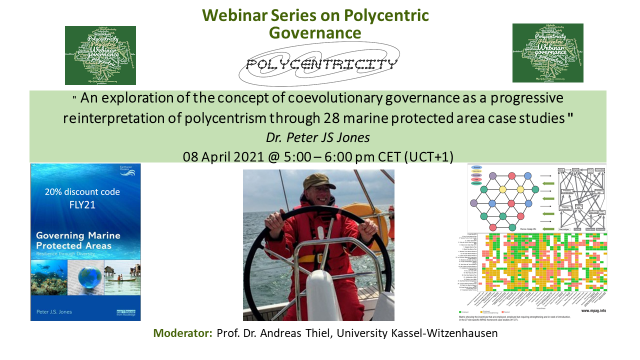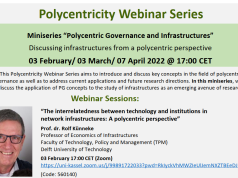The webinar on 8th April 2021 (recording below) focused on combining co-evolutionary governance and polycentricity in the analysis of Marine Protected Areas, with the title “Governing MPAs: Challenges of decentralization in the shadow of hierarchy” was presented by Dr Peter Jones, University College London (UCL). Andreas Thiel, Chair of International Agricultural Policy and Environmental Governance, University of Kassel, moderated the well-attended session that was complemented by lively discussions.
In his presentation, Dr Jones reflected on his long-standing research on MPAs and its conceptualization through the lens of Polycentric Governance, which he largely equated with exclusive self-organization. He criticized polycentrism’s reliance on vertical and horizontal linkages as a means of addressing scale challenges and related conflicts within and between ‘places’. He added from the CPR researcher’s literatures where such challenges and related collective active problems within and between places cannot be resolved through local deliberations and roles of horizontal/vertical linkages. These linkages act purely as channels for cooperation, deliberation, negotiation & conflict resolution amongst actors within and between different places, with no state interference from top-down. So, he highlights here, consequently centralized state intervention may be required. To overcome this limitation, he explained co-evolutionary governance and polycentricity through a combination of approaches (i.e. top-down, market and bottom-up approaches) and emphasized the role of mechanisms such as “the shadow of hierarchy” to recognize the role of the state. He mentioned that the concept of co-evolutionary governance addresses the dilemma of institutions either built from bottom-up through self-governance, or from top-down through state imposition. In his view, the first is in line with the concepts of polycentricity, meaning that they should be nested in higher level institutions, yet are not subject to state interference. The latter would be a classic monocentric conception. Therefore, Dr. Jones reasoned about the perspective of co-evolutionary governance as alternative conception in which institutions co-evolve through interactions of top-down and bottom-up processes/influences alike.
In his presentation, Dr Jones included corresponding strengths of top-down and bottom-up approaches in relation to nine key dimensions of marine protected area governance (MPAG), as well as the causes of resilient social-ecological systems. He presented a typology of 36 types of incentives, analyzing the diversity of approaches and considering how incentives from different categories interact with and support each other, co-evolving and working in combination through functional integration. Dr Jones’ explanations highlighted the state as more than a passive actor that, at times indirectly steers, in a manner that minimizes the risks of imposition and the risks of localism, that way strengthening effective and equitable governance in the shadow of hierarchy. Hence, so the argument, the state is a key agent in polycentric governance that has a crucial role to play in ensuring both effectiveness in achieving conservation objectives, and equity in distributing outcomes. The webinar presentation was based on recent peer-reviewed articles and books authored by Dr Jones and colleagues. As a starting point to this literature, please, consult the following publication: https://doi.org/10.1016/j.marpol.2020.104362.
Author: Md Rezaul Karim













